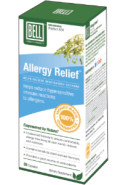Pet Allergy Solutions
Discover Top-Quality Solutions for Pet Allergies
There's no denying that pets are an integral part of many families. Over the past few decades, the percentage of households that own a pet in Canada has grown, ranking Canada as one of the countries with the highest pet ownership rates worldwide. Indeed, an estimated 38% of Canadian households own a cat, while 35% own a dog. Unfortunately, allergies to cats and dogs affect 10 to 20% of the world’s population, meaning that as much as some people long for a household pet, their immune system just isn't on board. Read more >-
 NATURAL ALLERGY RELIEF - FOR SEASONAL OR YEAR ROUND BELL ALLERGY RELIEF. For All Allergies Seasonal and year-round. Bell Allergy Relief works for environmental, seasonal nasal congestion, sneezing, inflammation of the eyes, seasonal pollen and plant allergies, perennial allergies, house dust, pets, food allergies and asthma. Based on...NATURAL ALLERGY RELIEF - FOR SEASONAL OR YEAR ROUND BELL ALLERGY RELIEF. For All Allergies Seasonal and year-round. Bell Allergy Relief works for environmental, seasonal nasal congestion, sneezing, inflammation of the eyes, seasonal pollen and plant allergies, perennial allergies, house dust, pets, food allergies and asthma. Based on many research studies. [CAPSULE]+ Earn 19 Reward Points
NATURAL ALLERGY RELIEF - FOR SEASONAL OR YEAR ROUND BELL ALLERGY RELIEF. For All Allergies Seasonal and year-round. Bell Allergy Relief works for environmental, seasonal nasal congestion, sneezing, inflammation of the eyes, seasonal pollen and plant allergies, perennial allergies, house dust, pets, food allergies and asthma. Based on...NATURAL ALLERGY RELIEF - FOR SEASONAL OR YEAR ROUND BELL ALLERGY RELIEF. For All Allergies Seasonal and year-round. Bell Allergy Relief works for environmental, seasonal nasal congestion, sneezing, inflammation of the eyes, seasonal pollen and plant allergies, perennial allergies, house dust, pets, food allergies and asthma. Based on many research studies. [CAPSULE]+ Earn 19 Reward PointsSale: $19.99
Reg.: $26.99 (Save $7.00)
In Stock
Pet Allergies - What Are They?
There's no denying that pets are an integral part of many families. Over the past few decades, the percentage of households that own a pet in Canada has grown, ranking Canada as one of the countries with the highest pet ownership rates worldwide. Indeed, an estimated 38% of Canadian households own a cat, while 35% own a dog. Unfortunately, allergies to cats and dogs affect 10 to 20% of the world’s population, meaning that as much as some people long for a household pet, their immune system just isn't on board.
Allergies to pets are not exclusive to those with fur, such as cats and dogs. In fact, people can be allergic to rabbits, guinea pigs, hamsters, ferrets, and horses. Even animals with feathers, like parrots and parakeets, can cause allergy symptoms in certain individuals. Interestingly, pet allergies have nothing to do with the actual fur of the animal. Rather, pet allergies are caused by a reaction to the protein found in the pet's dander (dead skin cells – think of it as animal dandruff), saliva, and urine. The fur or feathers is only implicated insofar as it collects the dander, concentrating allergens.
Symptoms Of Pet Allergies
Individuals that suffer from pet allergies typically display symptoms such as:
- Swelling and itching of the eyes and nose
- Stuffy nose and excessive mucus
- Sneezing
- Runny nose
- Postnasal drip
- Red, watery eyes
- Coughing and wheezing
- Hives
- Scratchy throat
People with pet allergies can have different sensitivity levels, with some having very minor symptoms and others suffering much more severely.
Supplements That Help With Pet Allergies
Many people use antihistamines to relieve allergy symptoms, but these can have nasty side effects. Natural remedies, including homeopathics, herbals, and other natural health supplements, offer an effective and safer alternative to managing pet allergies. Some of the most widely used include:
- Rehmannia – a potent anti-inflammatory herb traditionally used in TCM for itching, dermatitis, and rashes.
- Stinging nettle is another effective plant for pet allergies. It is also a natural anti-inflammatory and has been shown effective in helping reduce allergy symptoms.
- Butterbur - Butterbur is a plant extract, is often used to treat migraines and hay fever, also known as allergic rhinitis, thanks to its powerful natural antihistamine effects.
- Turmeric - Turmeric/Curcumin has a potent natural anti-inflammatory response, which is ideal for regulating immune function, down-regulating inflammation and enhancing the liver’s detoxification potential, all of which help mitigate allergic reactions.
Final Thoughts
Living with allergies can be challenging and even heartbreaking when the symptoms are caused by a pet you love. Many natural substances have proven antihistamine properties, meaning they can break down the chemicals that cause allergy symptoms in the first place. These include vitamin C, probiotics, omega-3 fatty acids, bromelain, astragalus, grape seed extract, French maritime pine bark extract, spirulina, and many others. An anti-inflammatory diet has also shown great promise in helping to manage all sorts of allergies. Consult a knowledgeable natural health care practitioner for advice on which supplements and herbals might be best for you.
Back to Top ↑





















